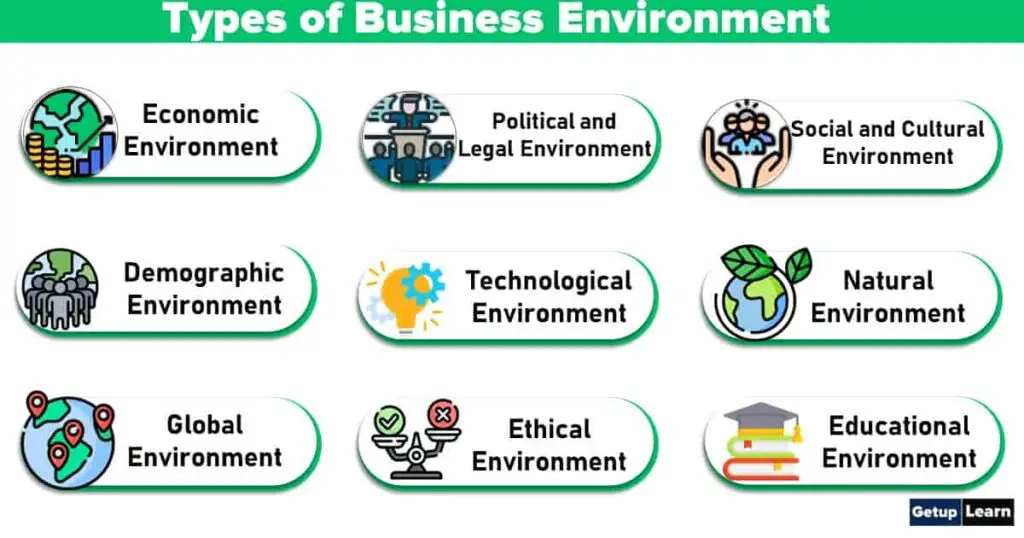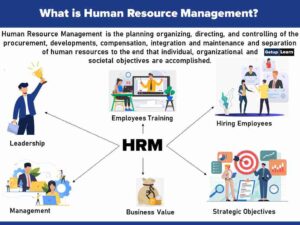In the previous article, we learn that the term ‘business environment’ means the sum total of all individuals, institutions and other forces such as government policies and regulations, nature of the economy, socio-cultural factors, natural factors, demographic factors, etc. that may affect the performance of the business.

So for a better understanding of the business environment, We briefly discuss the different types of business environments that need to be studied by a firm.
Types of Business Environment
The followings are the different types of business environments which are given below:
- Economic Environment
- Political and Legal Environment
- Social and Cultural Environment
- Demographic Environment
- Technological Environment
- Natural Environment
- Global Environment
- Ethical Environment
- Educational Environment
Economic Environment
Economic environment refers to all those economic factors which have a bearing on the functioning of a business unit. Business depends on the economic environment for all needed inputs. The business also depends on the economic environment to sell the finished goods. Naturally.
The economic environment comprises the comprise the economic system, level of banking institutions, fiscal and monetary policy, industrial production, agriculture, planning, basic economic philosophy, national income, per capita income, money supply, savings, stages in the economic development, trade cycles, price mechanism, money and capital market, resource availability and resource allocation, size of the market, infrastructural facilities, level of economic development, etc.
It is difficult to be precise about the factors which constitute the economic environment of a country. But still, there are some factors that have considerable influence. These factors are:
- Growth strategy
- Economic system
- Economic planning
- Industry
- Agriculture
- Infrastructure
- Financial and fiscal sector
- Removal of regional imbalances
- Price and distribution control|
- Economic Reforms
Out of the above-said factors, There are two importance of economic environment:
Economic Policies
All business activities or operations are directly influenced by economic policies framed by the government from time to time. Some of the important economic policies are:
- Industrial policy
- Fiscal policy
- Monetary policy
- Foreign investment policy
- Export-Import Policy (Exim policy)
Economic System
The scope of a private business and the extent of government regulation of economic activities depend to a very large extent on the economic system, which is an important part of the business environment. Broadly the economic system is divided into three groups.
- Capitalism
- Socialism
- Communism
Political and Legal Environment
The working of organizations in any society gets affected by the political and legal framework and the system within which they have to operate. The policy thrust given to different industries keeps changing with the change in political regime.
Let’s understand one by one the political and legal environment of business:
Political Environment
Political environment refers to the influence exerted by the three political institutions, viz., executive, legislature, and judiciary in shaping, directing, developing and controlling business activities. The legislature decides on a particular course of action; the executive, also called the government, implements whatever was decided by parliament and the judiciary plays the watchdog role in order to ensure that both the legislature and the executive function are in the public interest within the boundaries of the constitution.
The components of the political environment are the political approach of Government, political stability, national protection and defence policy, foreign policy, Govt. control, bureaucracy, government laws and policies etc. A stable and dynamic political environment is indispensable for business growth.
Legal Environment
The legal environment actually provided the ground on which the business activities can be effectively carried out. It has a social objective or motives. Every manager or policymaker has to enforce every legal provision when he formulates the policy and strategy. Every aspect of the business is regulated by Law in India.
Hence legal environment plays a very important role in a business environment. Constitutional provisions, commercial laws, economic laws (MRTP Act, FEMA, SEBI), industry and labour laws, pollution control laws, tax laws and policies, laws related to social control, company formation, nationalization, privatization, industrial licensing, socialization, factory administration, industrial disputes, payment of wages, trade unionism, foreign exchange regulations etc. are examples of the legal environment in India.
Social Environment
All business organization is a part of their society. It operates within the society and exists primarily to satisfy its needs. Hence the business organization has an inseparable position in the social system. While the social factors influence the policy and strategy of the business, the business organization strives to satisfy the needs and wants of society. Every business has a social responsibility.
The components of the social environment are population expansion and its characteristics (sex ratio (Male, Female), caste, religion, age structure, education, income), Family structure – may be nuclear or joint and role of family, mutual cooperation, level of public responsibilities, the mentality of the public towards work and wealth, social integration and disintegration, attitude towards management, ethical issues, distribution of income and wealth, equality of opportunity, social welfare, class structure, the social attitude of the masses towards the authorities and managers of the business, etc.
Cultural Environment
Cultural factors of the business environment should also be taken into consideration during the course of scanning the environment and policy formulation. Culture relates to the shared characteristics – language, religion, heritage and values that differentiate the members of one group of people from those of another or from one nation of people from that of another, values relate to basic beliefs of individuals and considerable importance and meaning are attached to them.
Managers need to be conscious and careful about the culture and values of their stakeholders, so as to develop and make strategies and actions compatible with them. Values of individuals greatly affect the operations of the organization, particularly to develop interpersonal relationships with the stakeholders.
The approach to identifying the problem, possible alternative solutions to the problem, clarity about ethical and non-ethical behaviour, and approaches to lead and control employees largely depend upon the careful analysis of cultural practices and values of people. Thus a careful diagnosis of culture and value system helps a great deal in understanding the expectations of customers, employees, and other stakeholders. This helps to develop appropriate response systems to manage effectively.
Demographic Environment
Demographic characteristics of the population reflect the details on parameters such as age profiles, gender profile, income levels of target group, size of families, occupation pattern, growth rate, economic stratification of the population, educational levels, life expectancy, language, caste, religion etc. are all the factors which are relevant to business and affect the demand for goods and services.
The understanding of these parameters helps in defining the characteristics of people comprising groups to comprehend the effect of these dynamics having direct implications on the organizational plans to achieve its objectives. Population growth directly affects the availability and composition of the workforce. The age profile of the population affects the dynamics as regards average age in the organization and its implications for absorption of new technology, ideas, and knowledge.
Technological Environment
The technology development of a country influences strategies of production, newer goods, raw material sources, marker, tools and equipment, services etc. Technological development has revolutionized industrial development.
The introduction of new technologies in an area leads to new products and services, advancement in production techniques resulting in cost advantages, and better ways to manage by way of improved communication systems and decision-making processes.
There are certain technological factors that will affect the businesses across the globe as per demand which would result in changing behaviour as per the need of traditional marketing.
The fast formulation of technology needs calculating explanation by businesses in order to persevere in a materializing economic environment and additionally preserve up with contemporary directions along with constructive motivations which detached combatants might be approaching.
Natural Environment
The natural environment includes geographical or ecological factors that influence business operations. These factors involve the availability of natural resources, weather and climatic condition, topographical factors, location aspect, etc. Business is greatly influenced by the nature of the natural environment.
For Ex: sugar factories are set up only in those places where sugarcane can be grown. It is always considered better to establish a manufacturing unit close to the sources of input. Further, the government’s policies to maintain ecological balance, conservation of natural resources etc. put additional responsibility on the business sector.
Global Environment
Environmental factors are fast emerging as the force to reckon with in the global or international environment. Business responses and managerial practices must be fine-tuned to the global environment. Every country is influenced by international events.
Thus, the activities of every organization are affected by international factors like the rate of inflation in different nations with which it trades. In the same way, different trade barriers created by many countries affect the domestic organization and their export efforts.
It is particularly important for industries directly depending on imports or exports, and import-competing industries. For example, a recession in foreign markets or the adoption of protectionist policies by foreign nations may create difficulties for industries depending on exports. On the other hand, a boom in the export market or a relaxation of the protectionist policies may help the export-oriented industries.
Ethical Environment
Businesses need to follow the ethical values of society. Ethics refers to the code of conduct that guides an individual in dealing with others. Ethical rules differ from legal rules as much as the former is not enforced by public authority therefore the latter is enforced by the public authorities.
Legal rules become needless when ethical rules are observed by businessmen. Society expects businessmen to act ethically. Business ethics are the key to the success of a businessman in long run. Enacting legislation and enforcing them rigidly is one way of disciplining businessmen. But legal rules are counterproductive as happened in our country. The best way is to motivate businessmen to frame their own codes of conduct and adhere to them.
Educational Environment
The business structure and environment are also affected by the prevailing education system, level of education, technological education etc. Educational facilities and training, higher education, research and development, management courses, administrative and legal education etc.
It helps in the development and progress of businesses and industries to avail the services of efficient, trained and skilled labour. But mere facilities of education and training are not enough for the development of the managerial class, efficient workers and technocrats. It is also essential that the people develop a positive approach and attitude toward education and training.
What are the 2 types of business environments?
Types of business environments can be classified into two groups: 1. Internal Environment, 2. External Environment.














